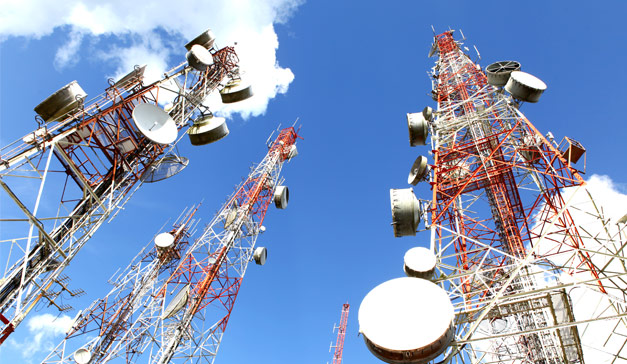Telecom
IFC, Telecom Infra Project Partner to Advance Digital Connectivity in Emerging Markets

International Finance Corporation (IFC) and the Telecom Infra Project (TIP), a global community of companies and organizations focused on infrastructure solutions to advance connectivity worldwide, have announced a new partnership that aims to accelerate the deployment of new and more cost effective cellular networks, particularly in areas of the world that are underserved or unconnected.

While connectivity has already reshaped the lives of those living in developed countries, the infrastructure that underpins it needs to be made available globally so that more people can get connected to digital services.
According to the UN Broadband Commission, almost half – 46.5% – of the world population remain unconnected. Despite the increasing availability of lower-cost technology, the industry has often struggled to provide adequate connectivity in areas where the business case hasn’t been so robust.
Even among those who have access, bandwidth constraints prevent many users from experiencing the full benefits of connectivity.
The pandemic and its socio-economic consequences have underscored the urgency of coordinated actions amongst all industry stakeholders and across all geographies.
In too many parts of the world, broadband connectivity continues to be prohibitive. According to the International Telecommunication Union (ITU), the price of mobile voice and data services alone, excluding equipment, still represent up to 12% of monthly Gross National Income (GNI) per capita in least developed countries.
Affordability is critical to connecting the unconnected. The shift to open and disaggregated networks will improve affordability and contribute to a more vibrant supply chain ecosystem with new technology providers, reducing business risks and ultimately enabling greater choice and flexibility in network deployments.
The TIP community and IFC are coming together to accelerate the deployment of Network as a Service (NaaS) solutions that leverage innovative technologies and business models, shared active and passive infrastructure and lower costs to help close the digital divide, especially in emerging markets.
TIP will work closely with IFC to ensure financial, environmental, and social sustainability take a central role in the deployment of digital infrastructure. IFC will make available its structuring capabilities and experience in investing in such sectors in emerging markets to participants of the TIP NaaS Solutions Group.
“IFC welcomes the partnership with TIP to work together on developing and funding practical solutions that enable further connectivity in emerging markets. Innovation is necessary to lower the breakeven point in network deployment, increase affordability and narrow the digital divide and NaaS can play an important role in this regard.
TIP provides a unique forum for funders, policy makers, operators and other industry stakeholders to guide decision making and problem solving around the ongoing challenge of affordability,” said German Cufre, Global Manager for Telecom, Media and Technology Investments at IFC.
“We are excited to have IFC join forces with TIP because it takes more than technology to solve connectivity problems around the globe. IFC brings its deep expertise in project financing, corporate governance and operational structuring to the Telecom Infra Project and our NaaS Solutions Group which will help align our efforts with the wider investment community,” said Attilio Zani, Executive Director of the Telecom Infra Project.
“For NaaS in particular, IFC and TIP will develop new approaches for the investment community to help them tap into the large addressable market created by the adoption of the NaaS business model.”
TIP and IFC are also encouraging other funding organizations to join in their effort to help close the digital divide through innovative business models delivering scalable, high-quality cellular connectivity to those who currently do not have it.
Telecom
Paradigm Initiative Champions Digital Rights and Inclusion at Africa IGF 2025 in Dar es Salaam

Paradigm Initiative (PIN) has reaffirmed its commitment to advancing digital rights and inclusion across Africa following its active participation in the 2025 Africa Internet Governance Forum (AfIGF), held in Dar es Salaam from May 29 to 31.

The forum convened diverse stakeholders from governments, civil society, the private sector, and academia to explore pressing internet governance issues under the theme “Building a Resilient Digital Ecosystem that Supports Africa’s Sustainable Growth and Global Leadership.”
PIN’s delegation contributed to conversations around digital security, digital rights and inclusion policy and compliance, emerging technologies, global governance, highlighting digital threats and making recommendations for an inclusive and rights-respecting digital landscape. Drawing from its research and advocacy efforts across the continent, the organisation offered practical policy recommendations aimed at fostering an open, secure, and human rights-respecting digital environment.
“The Africa IGF continues to serve as a critical space for shaping Africa’s digital future. We were pleased to contribute insights and amplify the urgent need for inclusive and rights-centric digital governance,” said ‘Gbenga Sesan, Paradigm Initiative’s Executive Director.
During the forum, PIN hosted and participated in multiple sessions, including: A panel on protecting civic space online, a workshop on bridging the digital divide through inclusive policies, and bilateral meetings with regional and global partners on shaping digital governance frameworks in the lead-up to key global internet governance conversations.
PIN’s presence at the AfIGF 2025 not only spotlighted emerging digital threats but also underscored its commitment to ensuring that all technological advancements and policies globally translate into greater digital freedoms and opportunities, not restrictions.
As part of its ongoing advocacy, the organisation will continue to engage with stakeholders across sectors to ensure that digital transformation in Africa is anchored in rights, equity, and inclusion.
Telecom
MTN Nigeria Unveils 21 Days of Y’elloCare to Empower Communities through Digital Tools

MTN Nigeria today held the opening ceremony for the 2025 edition of 21Days of Y’ello Care, the company’s annual employee volunteerism initiative.

This year’s campaign, themed “Connecting at the Roots – Connecting Communities through Digital Tools,” will run from June 1 to June 21, 2025, and focuses on supporting communities that continue to face barriers to digital access and connectivity.
MTN Nigeria kicked off on Sunday June 1 with trainings across different locations in Lagos where staff of the company volunteered to delivered training in valuable areas such as digital marketing and personal branding and employability skills.
In line with the Group-wide campaign theme, MTN Nigeria is implementing a series of grassroots initiatives aimed at expanding digital inclusion and connectivity in underserved areas.
Planned activities include equipping schools and community youth centres with devices, digital literacy workshops, deployment of community Wi-Fi access points, support for digital entrepreneurship and the establishment of an all-in-one Y’ello Pods across the country that will provide a digital hub for learning and support financial inclusion.
Speaking at the opening ceremony held in Lagos, Karl Toriola, Chief Executive Officer, MTN Nigeria said, Y’ello Care matters to us because we’re a digital company and we’re operating in an environment where there are so many needs. At MTN Nigeria, we care, and we want to show our direct connection and responsibility to the communities we operate in.
Now in its 18th year, Y’ello Care is a groupwide flagship MTN employee volunteering initiative that encourages MTNers to volunteer their time and expertise to support positive social change.
The campaign reflects MTN’s purpose to enable the benefits of a modern connected life for everyone and is anchored in the company’s core values.
In 2024, in a remarkable demonstration of corporate volunteerism, MTN staff, through the Y’ello Care initiative, reconstructed a school block at Iwerekun Community High School, Lakowe. This effort has restored hope and significantly improved learning conditions for both students and teachers.
For further information, updates on “21 Days of Y’ello Care”and MTN Nigeria’s commitment to social development, please visit yellocare.ng or follow us on social media.
Telecom
Google’s Open Buildings Data Empowers Africa’s Health and Climate Progress

Fresh, on-the-ground evidence from health planners and climate analysts in Rwanda, Nigeria and South Africa shows how the Open Buildings dataset, which maps more than 1.8 billion structures, is helping frontline projects close service gaps and strengthen community resilience.

Across the continent, artificial-intelligence tools are graduating from pilots to public-service workhorses, powering everything from crop-price forecasts to live language translation. Open Buildings—developed by researchers at Google Research Africa—is part of that shift, proving that open, locally guided AI can turn sparse data into timely decisions without locking African problem-solvers behind paywalls or proprietary gates.
In Rwanda, the Ministry of Health and Kigali-based Sand Technologies resited rural clinics with help from the dataset. Their new blueprint aims to bring 92% of citizens within a 30-minute reach of care, trimming journeys that put mothers and newborns at risk.
Across Northern Nigeria, epidemiologists at AFENET and geographers from WorldPop uncovered 10,250 buildings, guiding vaccinators who reached 70% of the zero-dose and under-immunized children identified through the mapping in just six months.
Meanwhile, the World Resources Institute (WRI) has already applied this flood-risk modelling in Dire Dawa, Kigali, Musanze, Gqeberha and Johannesburg, combining two-dimensional hydraulic simulations with building footprints to create block-by-block exposure maps.
The need is pressing: Nairobi is still recovering from the May 2024 floods that displaced more than 278 000 residents, while Johannesburg’s rapid growth along the flood-prone Jukskei River continues to heighten vulnerability
These projects tackle challenges felt across the continent. Africa still has about 8.7 million “zero-dose” children who receive no routine vaccines each year, while the urban population is projected to almost double to nearly one billion people by 2035— forcing new homes into high-risk floodplains and informal settlements.
By giving ministries, city engineers and NGOs a street-level view of where communities are growing and how they change over time, the Open Buildings dataset lets limited budgets flow to the people and places that need them most.
Dr Aisha Walcott-Bryant, Research Scientist & Head, Google Research Africa, “These projects show what happens when local expertise meets open, scalable technology: mothers reach clinics sooner, children receive long-overdue vaccines, and city planners get ahead of the next flood.
“We’re thrilled to stand beside partners who turn data into decisive action, proving that AI’s highest calling is to solve real-world challenges.”
From lifesaving clinics to climate-smart cities, these projects show how open AI is fast becoming Africa’s quiet engine for equitable progress.
The Open Buildings dataset—along with sample code, tutorials and its new 2.5D layer—is freely available at g.co/openbuildings.

 E-Business2 days ago
E-Business2 days agoFarmers to Get Identity Card for Loans, Inputs

 Telecom2 days ago
Telecom2 days agoARCON Probes 9mobile over Alleged N1Bn Advertising Debt

 News1 day ago
News1 day agoJAMB Waxes Worriedly over Rising Digital Exam Fraud

 News2 days ago
News2 days agoSERAP Sues NNPC over Alleged Missing ₦500Bn, Seeks Accountability

 E-Business1 day ago
E-Business1 day agoNIMC Plans to Register 95 Percent Nigerians by December

 E-Business2 days ago
E-Business2 days agoDyna.Ai Launches Operations in Nigeria

 News2 days ago
News2 days agoFirst Asset Management Receives 2024 Fund Manager Award

 Telecom1 day ago
Telecom1 day agoBanks, Telcos to Start Deducting USSD Charges from Airtime Today


























